人教版(新课程标准)必修一Unit 3 Travel journal 词汇复习课件(48张PPT)
文档属性
| 名称 | 人教版(新课程标准)必修一Unit 3 Travel journal 词汇复习课件(48张PPT) |
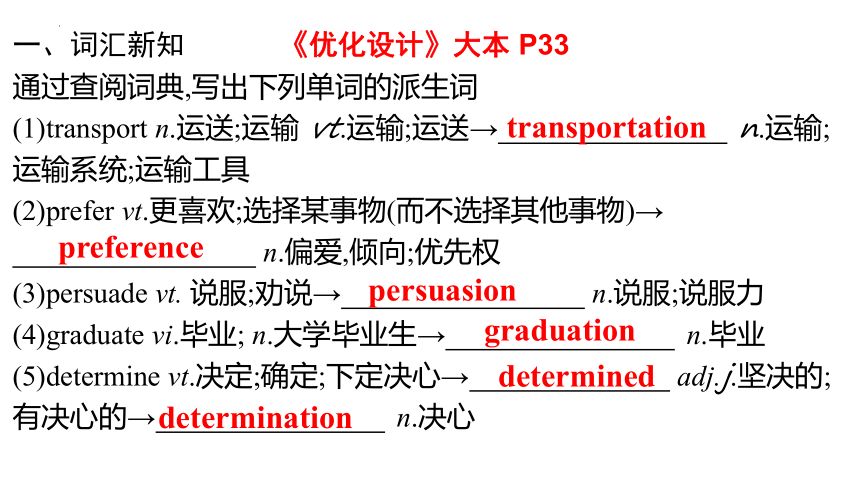
|
|
| 格式 | zip | ||
| 文件大小 | 1.5MB | ||
| 资源类型 | 教案 | ||
| 版本资源 | 人教版(新课程标准) | ||
| 科目 | 英语 | ||
| 更新时间 | 2023-01-04 13:05:42 | ||
图片预览


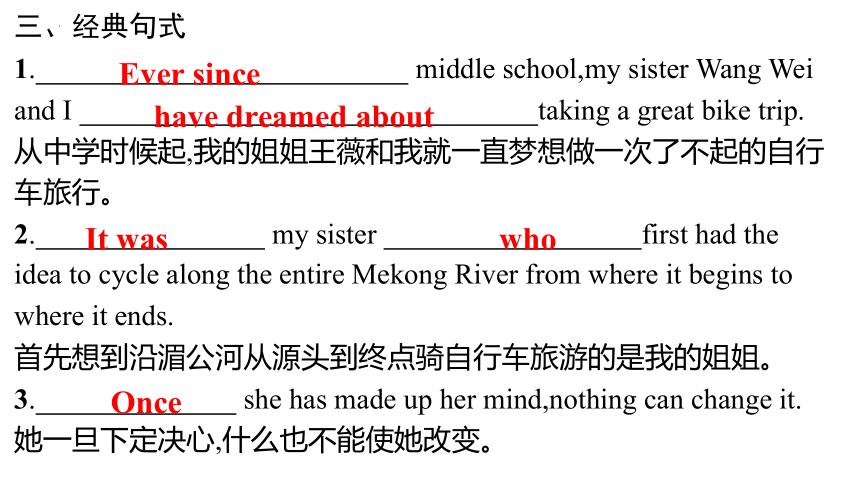
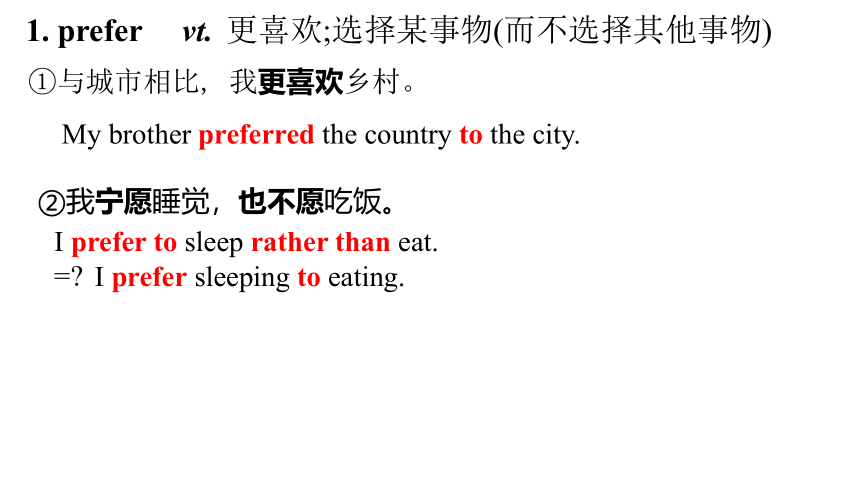
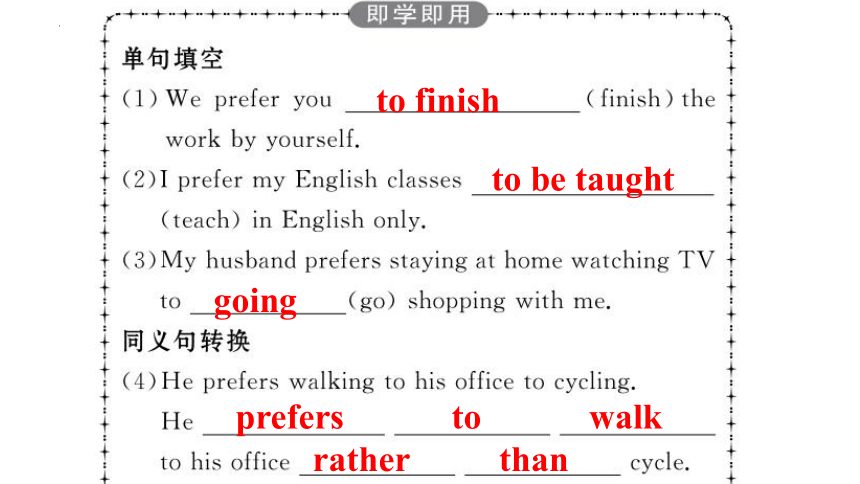
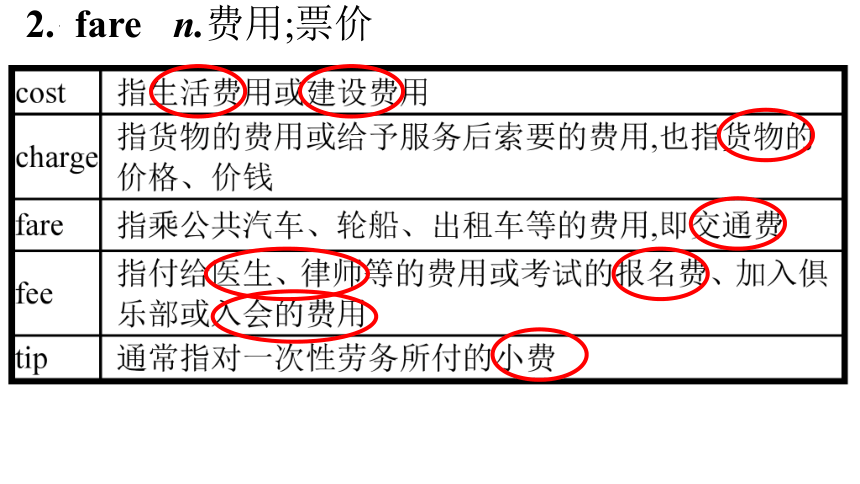

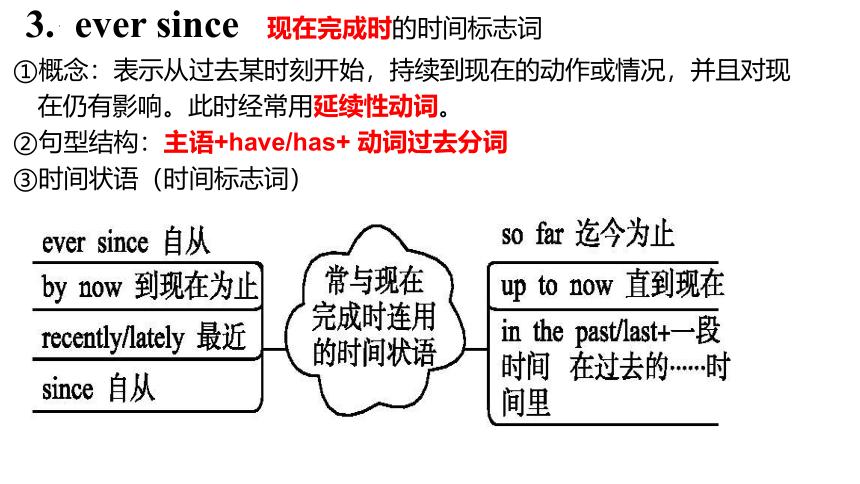
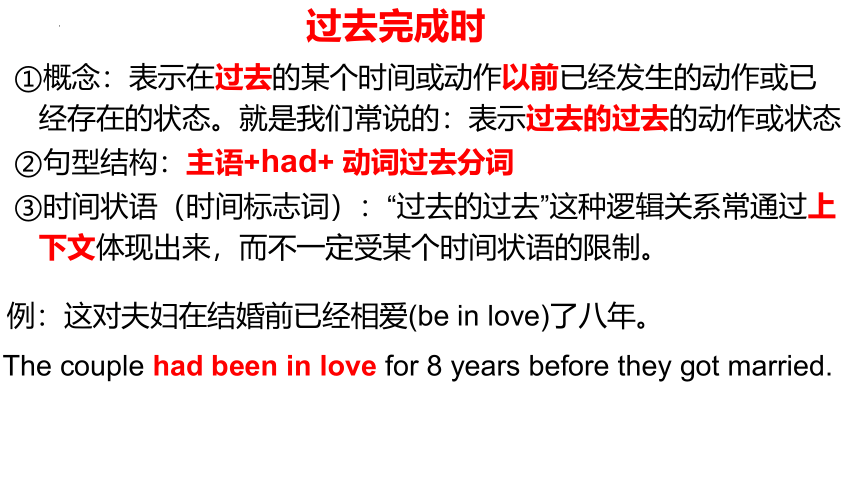
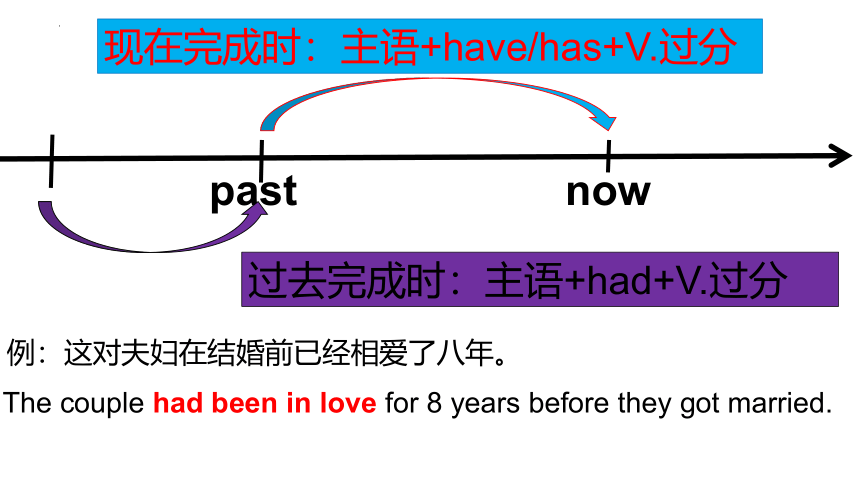
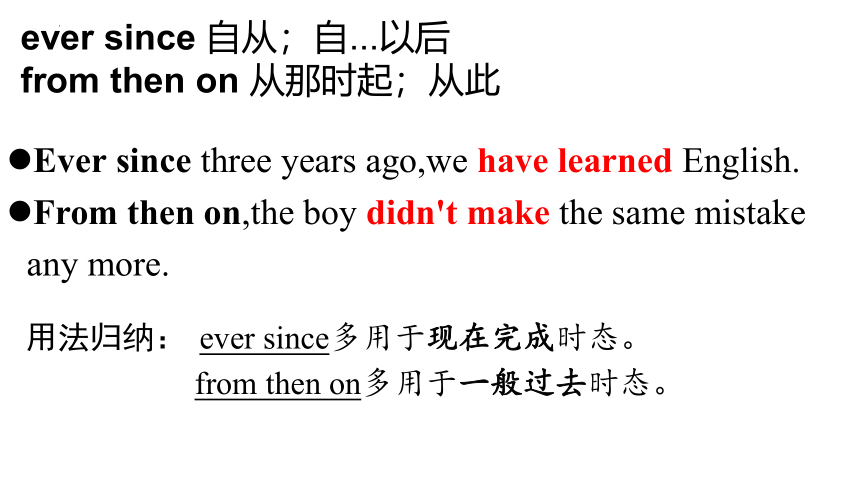

文档简介
(共48张PPT)
一、词汇新知 《优化设计》大本 P33
通过查阅词典,写出下列单词的派生词
(1)transport n.运送;运输 vt.运输;运送→ n.运输;运输系统;运输工具
(2)prefer vt.更喜欢;选择某事物(而不选择其他事物)→
n.偏爱,倾向;优先权
(3)persuade vt. 说服;劝说→ n.说服;说服力
(4)graduate vi.毕业; n.大学毕业生→ n.毕业
(5)determine vt.决定;确定;下定决心→ adj.j.坚决的;有决心的→ n.决心
transportation
preference
persuasion
graduation
determined
determination
二、核心短语
1. 自从;自……以后
2. 喜爱;喜欢
3. 关心;忧虑;惦念
4.change one’s mind
5.make up one’s mind
6.give in
ever since
be fond of
care about
改变主意
下决心;决定
投降;屈服;让步
三、经典句式
1. middle school,my sister Wang Wei and I taking a great bike trip.
从中学时候起,我的姐姐王薇和我就一直梦想做一次了不起的自行车旅行。
2. my sister first had the idea to cycle along the entire Mekong River from where it begins to where it ends.
首先想到沿湄公河从源头到终点骑自行车旅游的是我的姐姐。
3. she has made up her mind,nothing can change it.
她一旦下定决心,什么也不能使她改变。
Ever since
have dreamed about
It was
who
Once
1. prefer vt. 更喜欢;选择某事物(而不选择其他事物)
与城市相比, 我更喜欢乡村。
My brother preferred the country to the city.
我宁愿睡觉,也不愿吃饭。
I prefer to sleep rather than eat.
=
I prefer sleeping to eating.
to finish
to be taught
going
prefers to walk
rather than
2. fare n.费用;票价
fee
cost
tip
charge
fare
会员
服务
3. ever since
现在完成时的时间标志词
概念:表示从过去某时刻开始,持续到现在的动作或情况,并且对现在仍有影响。此时经常用延续性动词。
句型结构:主语+have/has+ 动词过去分词
时间状语(时间标志词)
过去完成时
概念:表示在过去的某个时间或动作以前已经发生的动作或已经存在的状态。就是我们常说的:表示过去的过去的动作或状态
句型结构:主语+had+ 动词过去分词
时间状语(时间标志词):“过去的过去”这种逻辑关系常通过上下文体现出来,而不一定受某个时间状语的限制。
例:这对夫妇在结婚前已经相爱(be in love)了八年。
The couple had been in love for 8 years before they got married.
现在完成时:主语+have/has+V.过分
past
now
过去完成时:主语+had+V.过分
例:这对夫妇在结婚前已经相爱了八年。
The couple had been in love for 8 years before they got married.
Ever since three years ago,we have learned English.
From then on,the boy didn't make the same mistake any more.
ever since 自从;自...以后
from then on 从那时起;从此
用法归纳: ever since多用于现在完成时态。
from then on多用于一般过去时态。
4. persuade vt.劝说;说服
n. 名词:
说服某人做某事:
说服某人不做某事:
使某人相信某事/使某人信服:
persuasion
persuade sb. to do sth.
persuade sb. into doing sth.
persuade sb. not to do sth.
persuade sb. out of doing sth.
persuade sb. of sth.
of
into
persuaded
to
out of
5. graduate vi.毕业 n. 大学毕业生
n. 毕业 graduation
毕业于...(学校):
毕业于...(学科):
graduate from
graduate in
from
in
graduating
graduated
用法1:被强调的部分是人时,引导词可用who,也可用that。
用法2:被强调的部分是句子的状语时,引导词用that。
用法3:被强调的部分是物时,引导词用that。
6. 强调句:
It+is/was+被强调部分+that/who+句子的其他部分。
who/that
was
that
7. be fond of +名词、代词、动词ing 喜爱;喜欢
is fond of
telling
Are
fond of
8. insist vt. 坚决要求;坚持认为
They insisted that their pay (should) be raised to improve their living conditions. 他们坚决要求提高工资来改善生活条件。
宾语从句
从句的谓语:should+动词原形,其中should可以省略
虚拟语气
常见的,后接宾从要用虚拟语气的动词还有:
四个“要求”:request, demand, require,desire
三个“建议”: advise, suggest, propose
两个“命令”:command, order
一个“坚持”: insist
(should)
finish
did/had done
organizer
9. care about 关心;忧虑;惦念
care about与care for的异同点
about
for
I don't care about what he says and does.
They hired a nurse to care for her.
10. determine v. 决定
adj.
n.
determined
determination
决定做某事
决定某事
使某人决定不做某事
决心做某事
determine to do sth.
determine on sth.
determine sb. against doing sth.
be determined to do sth.
determins/determined
determimed
I determine to tell her the truth./
I am determined to tell her the truth.
My friends told me never to change my mind.
11. make up one's mind
下决心;决定
mind 词组归纳
改变主意
记住
看懂某人的心思
change one's mind
keep in mind
read one's mind
Once you make a promise, you should keep it.
to be
die of 和 die from 的区别
(1) 若死因存在于人体之上或之内(主要指疾病、衰老等自身的原因),一般用介词of。如:die of illness (heart trouble, cancer, a fever, etc) 死于疾病(心脏病、癌症、发烧等)
(2) 若死因而是由环境造成的(主要指事故等方面的外部原因),一般用介词from。如:die from an earthquake (a traffic accident, a lightning, a stroke, etc) 死于地震(交通事故、雷击等)
(3) 若死因是环境影响到体内,即两方面共有的原因,则可用 of, from 均可。如:die of (from) a drink ( a wound, overwork, starvation, hunger and cold, etc) 死于饮酒(受伤、劳累过度、饥饿、饥寒等)
12. give in 投降;屈服;让步
give
词组
归纳
放弃;辞去(工作)
颁发;泄露;出卖
发出(气味、光、热等)
分发;分配;用光
give up
give away
give off
give out
in
up
off
out
away
随堂练习
一、单词拼写
1.We all decided to (组织) a concert for the New Year.
答案:organize
2.Jack (毕业) in physics from Stanford University last week.
答案:graduated
3.They went on a long train (旅行) across India.
答案:journey
4.One major (不便之处) of the area is the lack of public transport.
答案:disadvantage
5.Although I admit he has many (缺点),I like him very much.
答案:shortcomings
6.He is d to finish the job on time,no matter how hard it is.
答案:determined
7.You can learn how blood f through the human’s heart from the pictures.
答案:flows
8.My father thanked me a lot for p him to give up drinking.
答案:persuading
二、用适当的介词或副词填空
1.He tried to persuade me the truth of his words.
答案:of
2.To my surprise,the old man has a preference pop music.
答案:for
3.She graduated Cambridge with a degree in law.
答案:from
4.The next thing his schedule is to visit his former teacher.
答案:on
5.More and more young people are fond learning English and do well both speaking and writing.
答案:of;in
6.She insisted your saying “sorry” to her in public.
答案:on
7.The actress is very rich,but she doesn’t care clothes.
答案:about
8.I don't care that color.
答案:for
9.Both sides argued with reason,and neither would give to each other.
答案:in
10.He made his mind to tell the whole story.
答案:up
《优化设计》大本P39
一、词汇新知
1.通过查阅词典,写出下列单词的派生词
(1)boil v.(指液体)沸腾;(水)开→ adj.煮沸的;煮熟的→ adj.沸腾的
(2)wool n.羊毛;毛织品→ adj.羊毛的,羊毛制的
boiled
boiling
woolen
2.用所给单词或短语的适当形式填空
forecast as usual at midnight cave rely on
(1)After breakfast,Jack went to work .
(2)He said that Tom was a man who I could .
(3)I woke up and heard a strange sound,which made me frightened.
(4)The teacher that fifteen of his pupils would pass the exam.
(5)He said this was one of the that he used to play in.
as usual
rely on
at midnight
forecast/forecasted
caves
than
as
1. as usual
usual的词性?
副词形式是?
2. reliable 意为?词性?
动词:
rely
rely on/upon
rely on sb. to do sth.
rely
用法
归纳
依赖;依靠
指望/依靠某人做某事
reliable
on
I think he is not a reliable man./
I don't think(that)he is a reliable man.
3. n.风景;视野;观点;见解 vt.考虑
view
4. fun n.乐趣,快乐
①It is great fun playing the game with the children.
同孩子们一起做游戏是很快乐的事。
②It is not much fun to do the same work day after day.
日复一日地做同样的工作真是没趣。
(不可数名词)
adj. 令人愉快的
funny adj. 有趣的;滑稽的;古怪的
have fun with sb./sth.
of
with
It is fun listening/ to listen to you telling stories.
We play chess just for fun.
一、用所给单词的适当形式填空
1.My uncle is a strong and (rely) man.
答案:reliable
2.It is great fun (play) chess with you.
答案:playing
3.He could hardly wait (tell) you the good news.
答案:to tell
4.It is (forecast) on the radio that a big storm is coming tomorrow.
答案:forecast/forecasted
二、用适当的介词或副词填空
1.It’s not his work that bothers me;it’s his attitude the job.
答案:to/toward(s)
2.The teenagers had great fun sports games.
答案:with
3.We had a wonderful view the lake from the top of the hill.
答案:of
4.We can rely him to finish the work.
答案:on
5.My father went to bed early this evening usual.
答案:as
一、词汇新知 《优化设计》大本 P33
通过查阅词典,写出下列单词的派生词
(1)transport n.运送;运输 vt.运输;运送→ n.运输;运输系统;运输工具
(2)prefer vt.更喜欢;选择某事物(而不选择其他事物)→
n.偏爱,倾向;优先权
(3)persuade vt. 说服;劝说→ n.说服;说服力
(4)graduate vi.毕业; n.大学毕业生→ n.毕业
(5)determine vt.决定;确定;下定决心→ adj.j.坚决的;有决心的→ n.决心
transportation
preference
persuasion
graduation
determined
determination
二、核心短语
1. 自从;自……以后
2. 喜爱;喜欢
3. 关心;忧虑;惦念
4.change one’s mind
5.make up one’s mind
6.give in
ever since
be fond of
care about
改变主意
下决心;决定
投降;屈服;让步
三、经典句式
1. middle school,my sister Wang Wei and I taking a great bike trip.
从中学时候起,我的姐姐王薇和我就一直梦想做一次了不起的自行车旅行。
2. my sister first had the idea to cycle along the entire Mekong River from where it begins to where it ends.
首先想到沿湄公河从源头到终点骑自行车旅游的是我的姐姐。
3. she has made up her mind,nothing can change it.
她一旦下定决心,什么也不能使她改变。
Ever since
have dreamed about
It was
who
Once
1. prefer vt. 更喜欢;选择某事物(而不选择其他事物)
与城市相比, 我更喜欢乡村。
My brother preferred the country to the city.
我宁愿睡觉,也不愿吃饭。
I prefer to sleep rather than eat.
=
I prefer sleeping to eating.
to finish
to be taught
going
prefers to walk
rather than
2. fare n.费用;票价
fee
cost
tip
charge
fare
会员
服务
3. ever since
现在完成时的时间标志词
概念:表示从过去某时刻开始,持续到现在的动作或情况,并且对现在仍有影响。此时经常用延续性动词。
句型结构:主语+have/has+ 动词过去分词
时间状语(时间标志词)
过去完成时
概念:表示在过去的某个时间或动作以前已经发生的动作或已经存在的状态。就是我们常说的:表示过去的过去的动作或状态
句型结构:主语+had+ 动词过去分词
时间状语(时间标志词):“过去的过去”这种逻辑关系常通过上下文体现出来,而不一定受某个时间状语的限制。
例:这对夫妇在结婚前已经相爱(be in love)了八年。
The couple had been in love for 8 years before they got married.
现在完成时:主语+have/has+V.过分
past
now
过去完成时:主语+had+V.过分
例:这对夫妇在结婚前已经相爱了八年。
The couple had been in love for 8 years before they got married.
Ever since three years ago,we have learned English.
From then on,the boy didn't make the same mistake any more.
ever since 自从;自...以后
from then on 从那时起;从此
用法归纳: ever since多用于现在完成时态。
from then on多用于一般过去时态。
4. persuade vt.劝说;说服
n. 名词:
说服某人做某事:
说服某人不做某事:
使某人相信某事/使某人信服:
persuasion
persuade sb. to do sth.
persuade sb. into doing sth.
persuade sb. not to do sth.
persuade sb. out of doing sth.
persuade sb. of sth.
of
into
persuaded
to
out of
5. graduate vi.毕业 n. 大学毕业生
n. 毕业 graduation
毕业于...(学校):
毕业于...(学科):
graduate from
graduate in
from
in
graduating
graduated
用法1:被强调的部分是人时,引导词可用who,也可用that。
用法2:被强调的部分是句子的状语时,引导词用that。
用法3:被强调的部分是物时,引导词用that。
6. 强调句:
It+is/was+被强调部分+that/who+句子的其他部分。
who/that
was
that
7. be fond of +名词、代词、动词ing 喜爱;喜欢
is fond of
telling
Are
fond of
8. insist vt. 坚决要求;坚持认为
They insisted that their pay (should) be raised to improve their living conditions. 他们坚决要求提高工资来改善生活条件。
宾语从句
从句的谓语:should+动词原形,其中should可以省略
虚拟语气
常见的,后接宾从要用虚拟语气的动词还有:
四个“要求”:request, demand, require,desire
三个“建议”: advise, suggest, propose
两个“命令”:command, order
一个“坚持”: insist
(should)
finish
did/had done
organizer
9. care about 关心;忧虑;惦念
care about与care for的异同点
about
for
I don't care about what he says and does.
They hired a nurse to care for her.
10. determine v. 决定
adj.
n.
determined
determination
决定做某事
决定某事
使某人决定不做某事
决心做某事
determine to do sth.
determine on sth.
determine sb. against doing sth.
be determined to do sth.
determins/determined
determimed
I determine to tell her the truth./
I am determined to tell her the truth.
My friends told me never to change my mind.
11. make up one's mind
下决心;决定
mind 词组归纳
改变主意
记住
看懂某人的心思
change one's mind
keep in mind
read one's mind
Once you make a promise, you should keep it.
to be
die of 和 die from 的区别
(1) 若死因存在于人体之上或之内(主要指疾病、衰老等自身的原因),一般用介词of。如:die of illness (heart trouble, cancer, a fever, etc) 死于疾病(心脏病、癌症、发烧等)
(2) 若死因而是由环境造成的(主要指事故等方面的外部原因),一般用介词from。如:die from an earthquake (a traffic accident, a lightning, a stroke, etc) 死于地震(交通事故、雷击等)
(3) 若死因是环境影响到体内,即两方面共有的原因,则可用 of, from 均可。如:die of (from) a drink ( a wound, overwork, starvation, hunger and cold, etc) 死于饮酒(受伤、劳累过度、饥饿、饥寒等)
12. give in 投降;屈服;让步
give
词组
归纳
放弃;辞去(工作)
颁发;泄露;出卖
发出(气味、光、热等)
分发;分配;用光
give up
give away
give off
give out
in
up
off
out
away
随堂练习
一、单词拼写
1.We all decided to (组织) a concert for the New Year.
答案:organize
2.Jack (毕业) in physics from Stanford University last week.
答案:graduated
3.They went on a long train (旅行) across India.
答案:journey
4.One major (不便之处) of the area is the lack of public transport.
答案:disadvantage
5.Although I admit he has many (缺点),I like him very much.
答案:shortcomings
6.He is d to finish the job on time,no matter how hard it is.
答案:determined
7.You can learn how blood f through the human’s heart from the pictures.
答案:flows
8.My father thanked me a lot for p him to give up drinking.
答案:persuading
二、用适当的介词或副词填空
1.He tried to persuade me the truth of his words.
答案:of
2.To my surprise,the old man has a preference pop music.
答案:for
3.She graduated Cambridge with a degree in law.
答案:from
4.The next thing his schedule is to visit his former teacher.
答案:on
5.More and more young people are fond learning English and do well both speaking and writing.
答案:of;in
6.She insisted your saying “sorry” to her in public.
答案:on
7.The actress is very rich,but she doesn’t care clothes.
答案:about
8.I don't care that color.
答案:for
9.Both sides argued with reason,and neither would give to each other.
答案:in
10.He made his mind to tell the whole story.
答案:up
《优化设计》大本P39
一、词汇新知
1.通过查阅词典,写出下列单词的派生词
(1)boil v.(指液体)沸腾;(水)开→ adj.煮沸的;煮熟的→ adj.沸腾的
(2)wool n.羊毛;毛织品→ adj.羊毛的,羊毛制的
boiled
boiling
woolen
2.用所给单词或短语的适当形式填空
forecast as usual at midnight cave rely on
(1)After breakfast,Jack went to work .
(2)He said that Tom was a man who I could .
(3)I woke up and heard a strange sound,which made me frightened.
(4)The teacher that fifteen of his pupils would pass the exam.
(5)He said this was one of the that he used to play in.
as usual
rely on
at midnight
forecast/forecasted
caves
than
as
1. as usual
usual的词性?
副词形式是?
2. reliable 意为?词性?
动词:
rely
rely on/upon
rely on sb. to do sth.
rely
用法
归纳
依赖;依靠
指望/依靠某人做某事
reliable
on
I think he is not a reliable man./
I don't think(that)he is a reliable man.
3. n.风景;视野;观点;见解 vt.考虑
view
4. fun n.乐趣,快乐
①It is great fun playing the game with the children.
同孩子们一起做游戏是很快乐的事。
②It is not much fun to do the same work day after day.
日复一日地做同样的工作真是没趣。
(不可数名词)
adj. 令人愉快的
funny adj. 有趣的;滑稽的;古怪的
have fun with sb./sth.
of
with
It is fun listening/ to listen to you telling stories.
We play chess just for fun.
一、用所给单词的适当形式填空
1.My uncle is a strong and (rely) man.
答案:reliable
2.It is great fun (play) chess with you.
答案:playing
3.He could hardly wait (tell) you the good news.
答案:to tell
4.It is (forecast) on the radio that a big storm is coming tomorrow.
答案:forecast/forecasted
二、用适当的介词或副词填空
1.It’s not his work that bothers me;it’s his attitude the job.
答案:to/toward(s)
2.The teenagers had great fun sports games.
答案:with
3.We had a wonderful view the lake from the top of the hill.
答案:of
4.We can rely him to finish the work.
答案:on
5.My father went to bed early this evening usual.
答案:as
